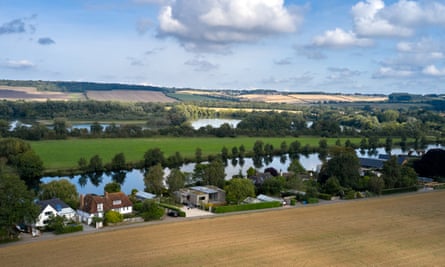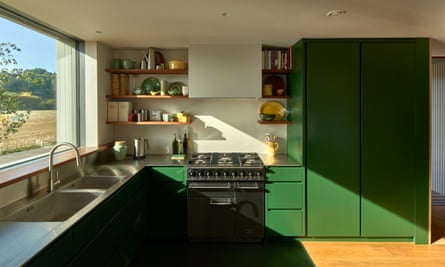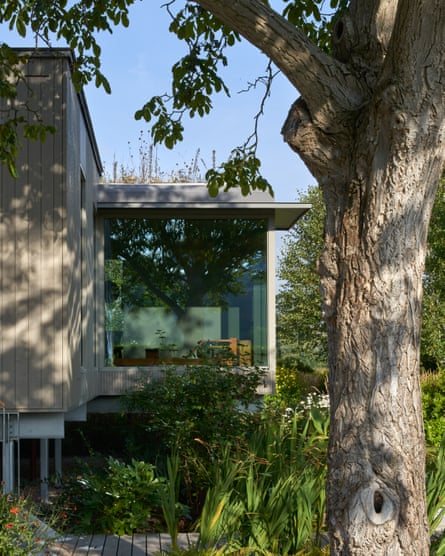
What could be more romantic than a house on the river with its ever-shifting views of swans, rowing boats and stately barges? But with water comes the chance of flooding. Which is why Elizabeth Rose decided to take pre-emptive action when she rebuilt her house. Rose’s new home, set on an idyllic, willow-fringed stretch of the Thames, downstream from Marlow, has been flood- and future-proofed in ways that belie the simplicity of its architecture.
The single-storey house, designed by London architects Knox Bhavan, was loosely inspired by the Edwardian houseboats that once lined the riverbank, and has just won the prestigious Architects’ Journal House of the Year award. The building replaced Rose’s former home – a “difficult” 1920s property where she lived for 17 years. “We looked into renovating it, but for all the things we wanted to achieve – energy efficiency, climate-proofing – it turned out to be more effective to start again,” says the former dancer. Besides, plots like these are rarities because most are handed down from generation to generation.
Instead of a conventional timber or concrete frame, the architect, Sasha Bhavan, used a system of pre-cut, pre-insulated blocks or cassettes, made from wood offcuts, which slotted neatly into place – a process that took three weeks. The wooden cladding is painted a silt-grey so that the house disappears into the setting with its backdrop of low hills. It is plain, but not boring, with a quiet, Shaker-ish charm. This is exactly what both the architect and the owner intended.
To prevent flood water coming into the house it perches on a grid of slim steel poles, keeping it raised above the flood level. If the river does burst its banks the water now rushes under the house – so that it appears to float – and is then soaked up by the silty flood plain behind, as it has done for millennia.
Before the road was built in the 1980s, this area was inhabited by a bohemian mix of weekenders who arrived by boat at their cottages and cabins, built in a hotchpotch holiday vernacular. Hardier types, says Rose, lived here throughout the year, some even commuting to work in London by river, even in winter when fogs descend. Rose, who talks evocatively about the setting – “the sounds of water splashing a jetty or a distant outboard motor” – enjoys the occasional “holiday”, pottering upstream in her boat with her dog to picnic on a shady riverbank.

Like all the properties here, this one is still off grid (apart from electricity). A ground-source heat pump powers the underfloor heating; a new borehole was recently dug for drinking water. The boathouse, built to replace the old one, has a charging point for the car. From the “green” roof, teeming with wildflowers to encourage biodiversity, pipes syphon excess rainwater into the riverside garden that Rose planted from scratch.
The garden is the only element that remains of Rose’s old home. Its layout dictated the design of the new house. While the front door is tucked modestly into the side, it is at the back that you really get a sense of how the house feels rooted in its setting. Wide doors open out to a flight of open-tread stairs connecting with the raised, wooden walkway that winds – like a pale ribbon – through the waving grasses and silver birches.
The interior feels similarly in tune with its surroundings. Lined in wood, it was designed to be flexible, with no redundant corridors. The wide, central living area is flanked by bedrooms and bathrooms, lit by skylights. Sliding doors can be pulled across to divide the spaces when family or friends come to stay. The collection of midcentury, mainly Scandinavian furniture, catalogued in files, determined the floorplan. Her Hans Wegner daybed is tucked into the alcove of a guest room. A pair of Heal’s bookcases frame the living area; a set of 1960s drawers inspired the study area. Her favourite painting, by Romanian artist Cristina Popovici, is hung on the freestanding wall that divides the sitting area from the dining room and kitchen, lined in green cabinets.

Instead of casements or sash windows, glazing is fixed and frameless with solid shutters that open for ventilation. The windows bring the views – of the apple trees or the river with its elegant scullers and pleasure boats – into every room, drawing your gaze like floating landscape paintings. On a high-summer afternoon, when aqueous shadows ripple across the ceilings, you want to move in immediately. A less romantic aspect of this Wind in the Willows existence is the flies. “In the old house you couldn’t have the lights on and the windows open in summer,” says Rose. Pull-out mesh fly screens, which disappear into the wall, provided the solution.
At least once a year, after a heavy winter downpour, the river rises, spilling over the jetty into the garden. Residents park their cars on the hill and don waders when they leave home. The prospect of flood water seeping under her front door has always been a hazard of living here, says Rose, who has grown to know and love this landscape well. But for now, it is one less thing to worry about.



